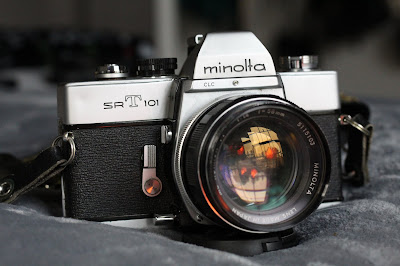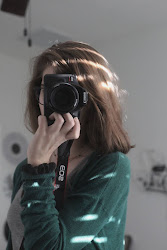Analog and Digital: Two Sides of the Same Coin
In 2021, everybody has the potential to be a photographer. We all have or know someone who has a camera in their back pocket - a cell phone. However, if we go back even 50 years this would be an alien concept. The photographic technology of the 70s looked much, much different than it does today. How does a camera from that time period compare to the tech of today? In this post, I will be exploring the pros and cons of digital and analog photography.
First, definitions. What does analog photography mean? The term is used to refer to any photographic process that relies on chemicals to produce a result. Any camera that uses film would be defined as analog. According to imaginated.com, digital photography uses "electronic photodetectors to form an image" (imaginated.com, 2021). Each of these processes have their pros and cons, and there is no right answer to which is better. It is up to the individual to decide which appeals to their needs the best.
Let's start off our list with the pros of digital photography.
1. Convenience
Digital photography, as stated in the intro, is available on almost every smartphone sold today. The ability to take out a phone to snap a photo, and to instantly see how the photo turns out, holds a convenience that analog methods will never compete with.
2. High storage capacity
Unlike film, that only has 20 - 30 images per roll, digital cameras can be customized with storage options anywhere from 12gb to 256gb. I looked into storage options for this article, and you can even buy (if you're willing to spend some $$$) a 1TB SD card for your camera! For those who aren't as tech savvy, 1TB is 1000gb. This proves the storage pro - digital cameras, and also cell phones, have larger storage than the capacity of a roll of film.
3. Quick advances
In 2021 the world is improving technology almost every month. Apple releases a new and improved iPhone, or some other device, each year. The same goes for camera companies. The digital photographic method is being enhanced regularly with state-of-the-art techniques for capturing the world. Some of these advances include improving autofocus, adding mirrorless options to lenses, face detection, and more (Butler, 2019). This will always have the potential for advances, while the same cannot be said for analog photography.
Ok, there are a lot of pros to digital photography. It's almost enough to question why anyone would choose an "old" photographic method over digital. But trust me, there are just as many pros to analog photography as there are to digital, like these:
1. Timeless
Analog photography will always be a relevant part of photographic history - it's how digital photography came to exist in the first place! Using analog can connect modern day photographers to the roots of the art. There is an intimacy to the analog process that cannot be replicated with digital. You, or a photo lab, have to develop the film that was exposed in the camera to even see how the photos came out. The analog process can teach photographers how to value the images they take - which leads me to my next analog pro...
2. Images have higher value
Because a roll of film has only so many attempts possible, you as the photographer learn to be more deliberate with the pictures you decide to snap. This also leads to the photos you end up with being more valuable than with a digital SD card full of mistakes and attempts.
3. Lower startup cost
Ok, hear me out. I might contradict myself later on in the post about this pro, but analog photography is cheaper to start out with than digital. This is only true if you're looking into a real digital camera and not just your cell phone. A starter film camera can be found for less than $100, while for digital a starter might be around $200 - $300 range. The additional cost for an analog camera is purchasing film and paying to see results. But, for example, if you purchase a cheap analog camera, like these on eBay, the next cost is film. With the rising popularity of film cameras, even Walmart is selling good starter film. As for developing, it is possible to do that for cheap as well. Drug stores like Walgreens develop film for a pretty good price (if you're okay with them keeping the negatives).
Of course, with all these pros, there have got to be some cons. Let's keep going with the analog method into our cons.
1. Limiting
This was also listed as a pro, but for some photographers it is a big con. Analog photography does limit your ability to capture the world with the number of exposures on a roll of film. If you're someone who needs to take a million photographs before you take the perfect one, maybe analog photography isn't for you. It is also a method that doesn't exactly agree with Grandma's need to take a selfie every time she sees you.
2. Not environmentally friendly
This is not something I hear a lot about in the photography community. It takes chemicals to process film, and those chemicals are not good for the environment. Some can only be used once before having to be dumped down a drain, and some can only be handled with gloves on. A roll of film produces waste as well. Each roll comes wrapped in an aluminum canister, which is also inserted into a plastic container. Overall, just not great for Mother Earth.
3. Cost
Yes, this was also a pro for analog, but the cost can be an issue for some. After finding the right camera, you will continuously have to purchase and develop the film that is used to capture images. For more advanced developing, check out this local lab that still develops film in Jacksonville. This con still ties into the pro of valuing the old photographic process, and some photographers use exclusively film because of its unique look, but for the everyday person it might not be the right choice.
So, are there any cons to digital photography? Of course! Here they are:
1. Less valuable results
This is the opposite of the analog pro - with the potential to take almost as many images as you need, the photographer ends up having a lot more images that are less valuable. This is broadly speaking because every photographer values their work differently, but I know from personal experience I am less deliberate with the scenes I capture digitally than I am with analog photography.
2. Reliant on technology
Even with all the amazing advancements we have made on technology in the past 50 years, there are still issues that can happen with that tech. Hard drives and SD cards can get corrupted, phones can be dropped and broken, the cloud could malfunction, the list goes on. There is a similar issue with analog, but that is more under the individual's control. With technology, you never know when something will break for perhaps no reason.
3. Cost/Skill
As I mentioned previously, advanced digital cameras can get really, and I mean REALLY, expensive. Here is a list of the most expensive digital cameras available today. Even some amateur digital cameras can still be hundreds of dollars. There is also some amount of skill needed to use and edit digital cameras and images. You need to know how to transfer images to the computer, edit them in a program, and put them on the internet for all to see. A digital camera has a lot more options and tech-y stuff than an analog one.
Congrats, you've made it to the end of my photography rant! As you may see, there is a lot to think about when it comes to the different photographic processes. Cost, history, the environment, and technology are just a few things I mentioned in this post, but there is so much more that goes into deciding between the two than just those things. If you're interested in pursuing either one, I would recommend trying both and deciding from there. Personally, I think actually using each type of process will help you out more than any pro and con list. Good luck!
Mentioned in this post:







Comments
Post a Comment